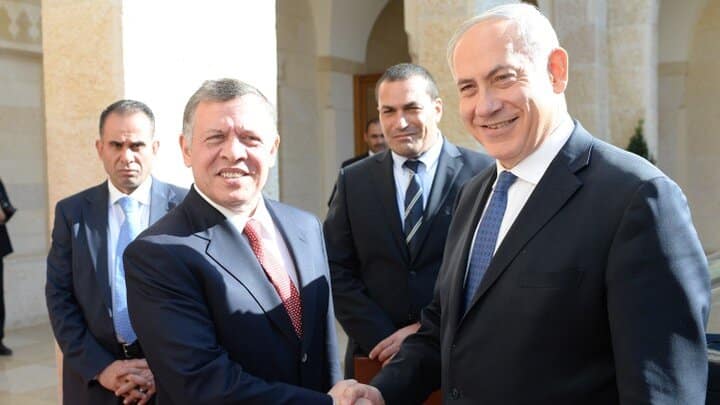“Secret Member” of Al-Naqab; Analysis of military-security cooperation between Jordan and Zionism.
Regardless of diplomatic negotiations or political statements, what is important in international relations are the “practical” measures, not the “declaration” of countries in the field. After the Al-Aqsa storm operation, the Arab countries of the region, especially Jordan, because of hosting a significant population of Palestinian descent and being geographically adjacent to the West Bank, have tried to present a face that is with the Palestinian nation and opposed to Netanyahu. Sending humanitarian aid by air or recalling the country’s ambassador from the occupied territories was part of Amman’s propaganda to quell the public anger of Jordanians towards the ongoing genocide in the Gaza Strip.
Contrary to the diplomatic campaign of the Jordanians, what happened on April 13th was the practical cooperation of the Jordanian defense system with the American-French partners to protect the skies of Israel. Although some news sources such as the Wall Street Journal and the Economist report the intelligence cooperation between Riyadh and Abu Dhabi with Tel Aviv, it was Jordan who rushed to help the Zionists in the field of action. In the continuation of this note, we will try to examine Jordan’s military-security cooperation with the Zionist regime by focusing on the provisions agreed upon in the Negev security meeting.
the Negev; The cornerstone of the Hebrew-Arab alliance
On the 28th of March 2022, the foreign ministers of the United States, Egypt, the United Arab Emirates, Bahrain, and Morocco gathered in the Negev desert to discuss and exchange opinions on the creation of a security-economic mechanism against the axis of resistance. It is interesting to note that at that time King Abdullah had gone to the West Bank to meet with Mahmoud Abbas and Ayman Safadi was also present in Doha. The non-attendance of Jordanian officials in that meeting caused some experts to think that Jordan withdrew from the meeting due to pessimism about the normalization of relations between Israel and the Persian Gulf countries or the fear of jeopardizing security talks with Tehran. These speculations were strengthened when the Jordanian foreign minister repeatedly emphasized that his country would never become a member of the anti-Iranian mechanism. However, what was left out of the media’s view was “the need for Jordanian sovereignty to accompany domestic public opinion” and “the 15-year defense agreement between the United States and Jordan”.
After Trump’s defeat and the Democrats gaining power in Washington, Jordan, along with Qatar, became America’s non-NATO partners, and Amman became the focus of American forces in the Eastern Arab region. In other words, Jordan became the center of support, logistics and operation of CENTCOM for the countries of Syria, Iraq, and occupied Palestine. Currently, 3,000 American troops are operationally present at the Al-Azraq base. Based on the agreement signed between Jordan and the US government, Washington committed to defend the land-air borders of this Arab country. In other words, in exchange for receiving 425 million dollars in aid from Washington, Jordan provided its skies to the defense-offensive systems of Centcom and then to the Zionist regime. Such an agreement would allow US officials to engage in direct conflict with resistance forces without feeling a serious need to obtain political permission from Amman. The formation of such a military alliance between Jordan and the United States has practically made this country a part of the security mechanism of the Negev, without the need for the Arab country to appear openly in front of television cameras.
The need to send a warning signal to Aman
Jordan has a significant geopolitical value for each of the actors active in the region due to its common border with the four countries of Syria, Iraq, the Kingdom of Saudi Arabia and occupied Palestine. Perhaps for this reason, the Americans tried to settle in the heart of the Eastern Arab region by reducing their military forces in Turkey-Qatar and transferring them to Jordan. Considering the increasing level of tensions between Iran and the Zionist regime, the need to correct Jordan’s behavior is felt more than ever. The Jordanian authorities claim that they took action against Iranian missiles and drones to protect the lives of citizens and prevent the scope of the war from extending to this country.
This claim is made while this Arab country does not take any serious measures to protect the lives of Palestinians, preserve the sanctity of the Al-Aqsa Mosque, or prevent the intensification of settlements in the West Bank. The question that arises is how the security apparatus of Jordan identifies and arrests people interested in the resistance, but does not leave the security agreements with Tel Aviv to support the Muslims of Gaza. The fact is that the rulers of Jordan, in the capacity of speech therapy, try to show themselves as “neutral” actors and supporters of the Quds cause, but in practice, they are the western infantry and part of the security puzzle of Centcom against the axis of resistance.

